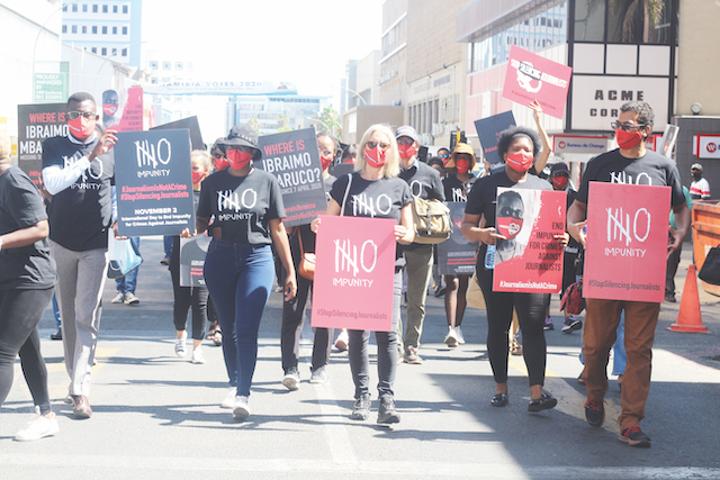Africa-Press – Namibia. INTERNATIONAL Day to End Impunity for Crimes against Journalists is a particularly sobering day for reporters.
Each year on 2 November, media practitioners gather to raise awareness and honour the lives of journalists killed for reporting the news globally, but also to reflect on the state of media freedom in their own country.
Building on a tradition established by the End Impunity for Crimes Against Journalists protest held in Windhoek last year, local reporters gathered at the Goethe-Institut for a film screening and panel discussion earlier this week.
The film screened is titled ‘A Thousand Cuts’ (2020) and tells the story of Filipino journalist and Noble Peace Prize laureate Maria Ressa who founded an online news site called Rappler.
Ressa and her team were subsequently threatened, sued and ostracised as the publication courageously reported on the political situation in the Philippines, particularly on the violent war on drugs.
Considering the advent and destructive potential of intentional fake news, as well as the danger to democracy should journalists be silenced through state-sanctioned intimidation, ‘A Thousand Cuts’ plays like a cautionary tale to journalists and societies the world over.
“In Africa alone, last year, 13 journalists were killed in nine months, and many more were incarcerated or just disappeared somehow. In fact, worldwide, last year has seen a sharp rise in the number of attacks on media practitioners and media outlets,” said fesmedia Africa’s Freya Gruenhagen at the opening of the event.
The screening was organised by fesmedia Africa, DW Akademie, Goethe-Institut Namibia, and Namibia Media Trust. Explaining the film title, Gruenhagen said: “It refers to any negative change that is ultimately leading to death, but happening so slowly that it goes unnoticed until it is too late to fight it.”
During a panel discussion, featuring Zoe Titus (civil society), Jemima Beukes (journalist), and John Nakuta (media ombudsman), moderator Peter Deselaers invited the experts to consider Namibia’s own cuts.
“I think in the last two years, we have seen a worrying trend of harassment and manhandling of journalists,” Beukes said. She also drew attention to less noticeable cuts against press freedom and democracy.
“We don’t pay attention to the small cuts, and those cuts are often in the newsroom. Cuts like the gross underpayment of journalists.”
Beukes said some journalists cannot afford to go home from the office, have no place to stay, and wait months for their salaries to be paid. Zoe Titus lamented the lack of access to information as one of Namibia’s cuts.
“I feel there is still a culture of secrecy in terms of the proactive release of data,” she said. Media ombudsman John Nakuta’s biggest cut is the potential for weaponising the law against journalists.
“I, as the media ombudsman, have this year received a lot of requests from people who want to sue journalists,” Nakuta said.
“What we’ve seen, also in the case of ReconAfrica, for example, is the trend of wealthy businesses, multinationals, threatening journalists about what has been written about them,” he said.
“So for me the cut is that the law is used to basically silence journalists.” Beukes believes the first step in improving the situation is providing journalists with a decent living.
“You can have all the laws in place and a journalist can still not do their job properly and optimally if they are not taken care of at home, which is our workplace,” she said.
“I think that is where we must begin.”
For More News And Analysis About Namibia Follow Africa-Press






